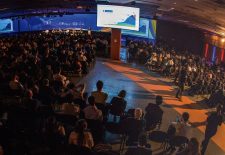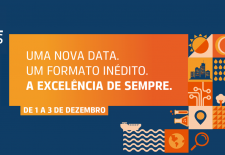Check out the exclusive interview with the Chair of the Organizing Committee about the news of the event
Five months away from being held, Rio Oil & Gas, the leading business and networking platform in Latin America, undergoes an unprecedented change of concept. For the first time in almost 40 years, it will be entirely virtual, between December 1st and 3th, 2020, and will no longer be a biannual event to become an innovation brand.
Find out more in an exclusive interview with Cristina Pinho, Secretary-General of IBP and Chair of Rio Oil & Gas Organizing Committee, about the latest news and what participants can expect from the 2020/2021 editions.
1- You take the lead in the top O&G event in Latin America, which, for the first time in almost 40 years, adopts an entirely digital format. What are the challenges of this format transposition?
CP: I don’t see any, contrary to what many people think, that the challenge is technological, because, for you to simply do the “from-to” from analog to digital, there are tools. The big challenge is in terms of behavior, breaking the paradigm of our industry, our executives, our participants, the companies that are participating in this event – especially the medium and small sized ones. We need to break this prejudice that it will not be possible to do a proper digital networking, that it will be very difficult for companies to draw the attention of our digital visitors to their product and brand. So, for me, the challenge is very focused on culture and also on us being able to prove to these companies value and efficiency: the final result of this Rio Oil & Gas can be very clearly and robustly successful.
2- In addition to the non-need for displacement, what do you think this new concept will add to people’s experience, both for congressmen and authors?
CP: For congressmen, authors and companies, I think we have to provoke a much greater capillarity of their reach. If we had 10,000 people in a traditional Rio Oil & Gas, we have to reach more people in a virtual environment like this. The virtual has no regional boundaries. So, for those who are presenting their research, want to be known, want their technical paper to be recognized inside and outside the country, this is a great opportunity. It is this possible reach that a virtual event can offer to its participants.
3- What can companies expect from this new format in terms of visibility for their services and solutions?
CP: I think companies have to know better the tools we are developing. So, as we prove to them that we’ll continue to be a great event, I think they’ll realize the value of participating in Rio Oil & Gas 2020. And it’s up to us to communicate that right. In addition, we have to listen to them – the difficulties they are coming across, what they perceive as obstacles to make their content, to get the attention of their audience. So, it’s also up to us to provide solutions for companies that don’t have the experience of attending an event like that.
4- Besides the new coronavirus pandemic, what caused this change of concept?
CP: I see Rio Oil & Gas 2020 very much as this pilot of a digitalization that has no turning back. I don’t think any event is going to stop being virtual. It can be physical too, but without leaving the virtual side. I think this was a movement that was already happening. Precisely because people want to reduce their carbon emissions, events have been exploring this kind of sustainability. It was getting harder and harder for people to move around the world, it’s been getting more tiring for you to do that, and I think the pandemic accelerated a process that was natural and was already taking place, which is this reduction of physical events combined with virtual ones. So, I think the 2020 edition is going to be a great test, the great pilot, mainly to break these resistances that exist in some segments of our industry.
5- What can we expect in terms of adaptations in the program and previously proposed themes?
CP: We will make use of all the selected papers. Many of them will be presented not only in these three days, since Rio Oil & Gas will become a digital platform with events throughout the year, until culminating in a new edition in 2021. So, all this technical and knowledge framework that was developed and elaborated for Rio Oil & Gas’ traditional format will be available throughout the year and also in Rio Oil & Gas 2020 itself. This year’s agenda comprises congress, CEO Talks, events sponsored by companies, coffee break, happy hour and lectures, which will promote networking amongst people, because we know how important this is: companies and people connecting. So, we will promote this knowledge network and we will not, of course, fail to pay attention to this promotion of technical knowledge, which is one of Rio Oil & Gas cornerstones.
6- Next year, there will be a hybrid version of Rio Oil & Gas. What will be the convergence points between the 2020 and 2021 editions?
CP: There will be many convergence points, because the platform, for example, will be the same, but with the improvements that we identify in Rio Oil & Gas 2020. We will add other products that we identify as valuable to our sponsors. We will have a digital platform, virtual, which will accompany Rio Oil & Gas 2021. And it will have its physical part, with physical activation spaces and studios, in which people will be able to participate physically in lectures, conversations, dialogues, in a format that also allows a strong virtual interaction from the public. In addition, another converging point is the participation of sponsors and exhibitors in this experience. Through the same package, those who participate in Rio Oil & Gas 2020 will also join 2021 for the same investment.
7- Rio Oil & Gas will go from being biannual to becoming an innovation brand platform. Do you see the conference to growing and perhaps repositioning itself?
CP: Absolutely. How are we going to persue this growth? Not only with the number of people who will come to know Rio Oil & Gas, who will attend in this new format, reaching a larger audience in Brazil and worldwide, but also with other companies. So we have an ambition to really reach other segments that make up the energy sector today – alternative energies, electric energy, offshore wind, renewable energy. Besides that, we want to attract innovation companies, companies that support virtual technology. And there is a whole financial segment that we want to bring into this new Rio Oil & Gas. There is, indeed, an economic and financial market that has an interest in getting to know the segment better, to take knowledge from the oil and gas sector to these investment groups. We want to attract these companies to get to know and participate in Rio Oil & Gas.




